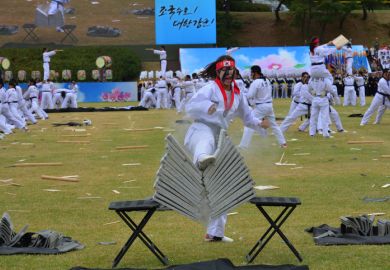This is not an easy book to read, and at first sight the author seems a little detached from his own life. But at its heart this analysis of science and the scientific world is a jewel. How to Win the Nobel Prize is an inspirational book, full of careful analysis and judgement.
The first chapter, "The Nobel prize", gives us images of J. Michael Bishop, joint winner of the Nobel prize for medicine in 1989 for his discovery of the cellular origin of retroviral oncogenes, as a new American struggling with old Europe, worried about formal dress and ties.
Old Europe can certainly have its funny side. I remember inviting a colleague of the author to tea at Claridges, which meant that he had to arrive in London with a tie and jacket. I was then harangued by the head waiter after being delayed. My American friend said: "Gee, is this all part of the tea party to be humiliated in front of your guests and then pay cash for it." Less entertaining for British readers is the discussion that follows in the book on Bishop's decision about which medical college to attend, akin to asking an American the difference between Blackburn Rovers and Arsenal - answer: blank. But by the middle of chapter two we are on our way.
The author is full of advice for budding scientists. "Frenzy is the energy of reflection and reflection is central to discovery," he writes. He castigates the 16-hour-a-day scientist, rushing around the world. Calm down, he says, think more, relax. Best of all, I liked his clarion calls on the balance of research and teaching - obligatory reading, I feel, for university deans.
He recalls the debt owed to teachers at every step of his education for helping to shape his aspirations and talent. His view that "intellect is amongst our most distinct and precious possessions and the exercise of intellect our greatest pleasures" and that "the desire to teach is visceral; it requires no defence and is a vocation" captures a very current dilemma.
Cardinal Newman, in The Idea of a University , felt that teaching and discovery were distinct functions and distinct gifts not commonly found in one person, and that the greatest thinkers shunned the lecture room. I think this is balderdash and so does Bishop, for whom it is "a malign view of our estate: the glories of great intellect, absent minds and idiosyncratic habits need to be on display in the classroom" and for whom "the noblest calling of a modern academic is to combine the distinct crafts of discovery and teaching in the same person". Wow!
In his analysis of why science succeeds, there are some serious, even deadly serious, lessons for politicians and for the political beasts who roam the corridors of universities, institutes and even medical schools. While Bishop acknowledges that individual scientists are often intolerant and unfair, he stresses that quality must prevail in the practice of science. "It is no accident that where the stranger is welcome there is both tolerance and genius," he states.
The keystone of this dissertation comes next: science thrives on a sense of community. "Scientists are as gregarious as termites, joyful with deep lasting friendships," he writes. I can vouch for that.
The chapter on cancer is a difficult one - with a discussion of proto-oncogenes and the like - but by the chapter "Paradoxical strife" we are back on track, asking whether the age of science and technology is the beginning of the end for humanity. Bishop wants this final chapter to be a substantive one, and it is. It has its funny side too: the anecdote about the elderly Californian who accuses him of bringing DNA into the neighbourhood, for example. As Bishop wearily says, there is quite a bit of DNA already there, what with there being some 822 trillion metres in every resident.
In this chapter, we confront issues of genetic testing, stem-cell research, even Darwinian evolution. Only in the US could creationism be a real issue. To my mind, it is an amusing, sad and ultimately dangerous paradox - a superpower throwing out the Ascent of Man .
This means the book ends with an analysis of a vendetta by some against science. Rapidly we move through disappointment, distrust, suspicion, disdain and outright ignorance. At the end, the author gives us a warning that the difficulties of going forwards in science will be large but will still pale in comparison with the loss from holding back.
John Oxford is professor of virology, Imperial College London.
How to Win the Nobel Prize: J. Michael Bishop
Publisher - Harvard University Press
Pages - 1
Price - £18.50
ISBN - 0 674 00880 4
Register to continue
Why register?
- Registration is free and only takes a moment
- Once registered, you can read 3 articles a month
- Sign up for our newsletter
Subscribe
Or subscribe for unlimited access to:
- Unlimited access to news, views, insights & reviews
- Digital editions
- Digital access to THE’s university and college rankings analysis
Already registered or a current subscriber?



